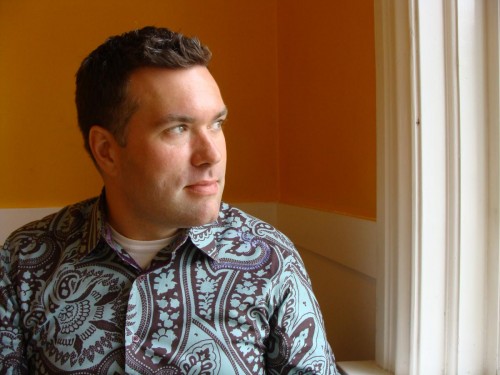Matthew Simmons
Matthew Simmons lives in Seattle.
Matthew Simmons lives in Seattle.

Patricia Lockwood is a poet. (A poet. A very good poet.) She also uses Twitter in interesting ways. Earlier this year, her series of SEXTS got attention from Rhizome, and then The Huffington Post & The New Yorker.
And I look at those tweets and I wonder, “How does someone do that?” Not get attention, though. I mean write those. How? So I asked.
***
So, I was initially pretty dismissive of Twitter. And then, at some point, I noticed how funny it could be and found it to be a mostly worthwhile distraction. And then—probably while reading the fake Christopher Walken feed—I began to think there could be something kind of poetic about Twitter. That each little update could be a joke, a persona poem, a zen koan.
Did you sense the “poetic” potential in the Twitter post from the beginning or did your approach to Twitter change?
It took me about ten years to join Twitter because, like old men everywhere, I “did not get it.” What is the … where are your mentions … what is hashtag … who is a belieber? When I did join, I spent my first week livetweeting the movie Bambi, focusing specifically on the puberty of Bambi and Thumper, and was subsequently unfollowed with extreme prejudice by the few poets who had charitably followed me in the first place. (This still happens! A real writer will follow me and then four days later be like “what the freak is this” and it is goodbye. CAN’T believe you wrote a tweet about Jesus jelqing.)
OK, so scrolling back, I see that one of my earliest tweets was “I want to see the Beethoven movie where Beethoven finally manages to tear his way out of the dog’s body and play something good on the piano.” About two weeks later I sexted for the first time, like a teen. So it wasn’t so much that I saw the possibilities right away as that … Twitter is the perfect way to disseminate the kind of writing that comes most naturally to me.
READ MORE >
Do you think a blog without comments loses its readership a) quickly or b) slowly?
Stacey Levine on Ryan Boudinot: “This one whom some were following was calm and restrained. His work shows so much work. Thousands of bees in his brain. His work makes its own ceiling, then bursts the ceiling again and again. Those calm, compact manners and the close shave. But you sense at any moment the gentlemanly restraint could fall away. At the spelling bee he was the most polite of them all. He is not in love with the normal. But I think he dislikes the abnormal, because, after all, the normal and its trajectory is so much more complicated and interesting.”

Massive Novel Alert: Today marks the official release of Ryan Boudinot’s massive (in all senses of the word[seriously—it’s going to create a gravity well]) new novel Blueprints of the Afterlife(Grove 2012). I got a chance to read this early on. I like Ryan’s work. I like Ryan. Ryan’s a solid citizen of literature in Seattle. And everywhere. I figured I would like the book.
I didn’t figure it would be as expansive, as imaginative, as powerful, and as quaking as it it.
Seriously. It’s awesome. Take a look. Here’s a sample chapter.
Over the next few days, I’ll be posting some Boudinot appreciations and a round-up. (And if anyone reading has something they’d like to add, feel free to get in touch with me @ giantblinditems @ gmail dot com.) Today, though, we begin with a long interview with the author.
***
You’ve written flash stories, short stories, a short novel, and a really long novel. Do you have a length at which you feel most comfortable?
You’re really wanting me to start this interview with a penis joke, aren’t you?
Heh. For the record, I think that no matter what is said in this email chain, we should use it in the interview. So, that line. And this caveat. We should just use everything said in here.
So, yes. READ MORE >

The Crow Arts Manor—a new-ish writing endeavor in Portland that hosts readings and sets up workshops with Massive folks like Kevin Sampsell, Emily Kendal Frey, Zachary Schomburg, Lidia Yuknavitch, and Monica Drake as instructors—is gathering a library. Here’s a note I got from the director, Sid Miller:
Crow Arts Manor, located in a Northeast Portland, is a 501c3 non-profits writing center, that provides low costclasses and workshop. Over the last 9 months we’ve been hard at work assembling a literary library. Through donations we’ve been able to obtain a large amount of current literary journals, magazines, books of poetry, short fiction and criticism. But it’s been difficult to obtain the classics, from writers going back to Whitman reaching to the end of last century. So now we’re asking the public for help. We’re looking for folks willing to donate a title or more from their own personal library. Our library will be open to the public and will be a tool for local writers, as well as local schools and non-profit organizations. It will be a place to read, write, and engage with other writers. We will never charge a fee for use of the library. If you are willing to donate, we are happy to send you a present, a past copy of Burnside Review (our partner). Please e-mail me if you are interested in helping.
sid@crowmanor.org
Help ’em out?
I was listening to an interview with Jonathan Gold and was thinking, “Off the top of my head, I can’t think of anyone who hates Jonathan Gold and his writing.” (I could be wrong. There are probably chefs in LA who hate Jonathan Gold and his writing.) I was wondering, then, if Jonathan Gold sort of untouchable. Or if anyone is untouchable. I thought I’d ask you. Readers: Writing-wise, is anyone untouchable?

[Matchup #32 in Tournament of Bookshit]
‘Lyric Essays’
Before he got married, my friend Michael couldn’t really be bothered to spend a lot of time cooking for himself. Or, well, he wasn’t really motivated to invest a lot of his precious time in the act of preparing food in a kitchen for his consumption. (I’m sure Michael would appreciate me telling you that once he began his long-term, now state/church sanctioned relationship, this changed.) Also, Michael didn’t really have a lot of money. So, not having the finances to go out to eat every night, and not having the inclination to spend a lot of time cooking—because he was instead inclined to read and learn banjo—Michael ate a lot of Banquet Turkey Pot Pies. READ MORE >
“The Mona Lisa Curse,” by Robert Hughes. Part one of six.
UPDATE: “Apart from drugs, Art is the biggest unregulated market in the world.”